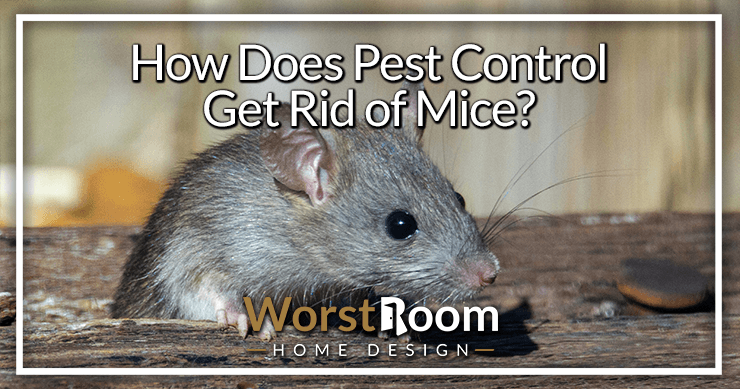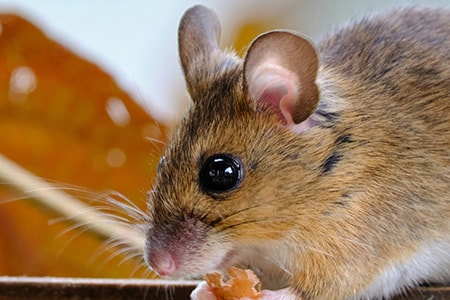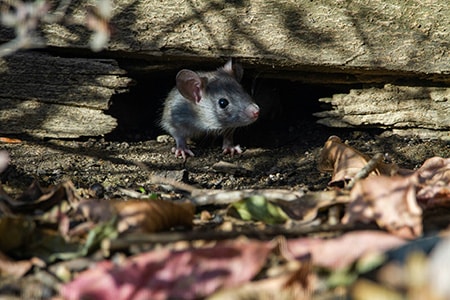How Does Pest Control Get Rid of Mice?
Author: Jen Worst | Editor: Omar Alonso
Review & Research: Jen Worst & Chris Miller

How does pest control get rid of mice from homes and how can you be ready in case you ever have a mouse infestation? Let's take a look at it!
Mouse infestation appears to be a constant wherever people reside. Although they might catch a few mice, mouse traps cannot stop rodent infestation. Mice are incredibly prolific because humans give them everything they require. If the mouse infestation is not stopped, you will eventually have to deal with dead mice, urine, and droppings from the mice, which can spread disease.
For many homeowners, controlling rodents is a serious concern. Mice and rats have the ability to contaminate food, spread disease-causing pathogens, and harm structures. Moreover, skilled chewers and rodents are renowned for using their strong front teeth to gnaw through obstacles.
Although the assortment of do-it-yourself rodent control products at your neighborhood hardware store may be alluring, if not executed correctly, these approaches may prove to be ineffectual or even dangerous for the occupants of your home. A house mouse might appear to be a benign organism. But later on, they'll cause even more issues. So, how does pest control get rid of mice?
Mice infestations can be handled in a number of ways by pest control businesses. Pest control businesses may place different mouse traps in different areas of the house if the mouse infestation is not too bad. They might use a variety of techniques, like bait stations, glue traps, snap traps, humane mouse traps, or traditional wooden snap traps. To get rid of the mice, at least most of them, professional pest control companies use an efficient method.
Pest control experts will not stop at eliminating mice; they will also use their understanding of mouse behavior, reproduction, and feeding habits. They also guarantee that the mice will not return. Here are some methods that licensed pest control companies use to get rid of mice so that you can be sure you won't have any rats around:
Inspection is the First Action

It is strongly advised that you regularly inspect your home to get rid of rats. Mice are dependent on people and will come near you. Inspections for pest control will reveal the entry points, breeding grounds, crawl spaces, and other places where mice will live. It won't be sufficient to eradicate mice from your home or to put anything there that they detest. The secret to keeping the mouse population from getting out of control is to know your house well.
That is, to handle any particular situation where pest control is required, an initial inspection is imperative. Experts utilize their inspection procedures to identify precisely which pests are present and how big of a problem they pose.
Their inspections can also be used as a preventative measure by identifying potential entry points for future infestations in your home. You should have at least one general pest inspection per year, even if there isn't an active infestation. Inspections are a crucial part of keeping your home safe and pest-free.
Determining the Kind of Mice

Understanding pests thoroughly is a crucial first step in managing them. All states have a common problem with roof rats, Norway rats, and house mice.
Despite their initial similarity, mice are considerably smaller animals with a longer, thinner tail and a smoother coat. In addition to having a rough coat and a thick, scaly tail, rats can weigh up to one pound. In their pursuit of sustenance, hydration, and refuge, they can both infiltrate houses. Making sense of mouse traffic requires the identification of these animals in order to guarantee their future strategy formulation.
Exterminators must be fully aware of the situation before treating your home. They precisely identify the type of pest they are dealing with during the inspection phase. After they have that knowledge, they can apply their knowledge of pest biology and ecology to develop a treatment strategy that will work best for your particular circumstance.
Treatment for Mice Control

When it comes to treatment, the professional approach really shines. Expert has a vast array of tried-and-true treatment options that are tailored to your specific needs and can be either proactive or reactive.
By using treatment, they hope to get rid of the current infestation and leave your house in the best possible condition to stop future infestations. They want to collaborate with you at every stage of their collaborative process to guarantee that your home is free of pests.
A popular technique for eliminating mice is the use of mousetraps. To optimize their effectiveness against the mice in your house, your exterminator will position them away from the areas that are used the most frequently.
Instead of loitering on kitchen counters or tables, mice prefer to stay away from people and relatively close to the entrances to their nests as well as their escape routes. Experts will set up traps in crawl spaces, attics, and basements. Traps work well, especially when positioned correctly, but mounting several sources of attack power is necessary for more thorough destruction.
A powerful supplement to your mouse-eradication efforts can be rodenticide. When used sparingly on your home's exterior entry points, rodenticides can effectively halt an infestation. The follow-up is just as crucial as the original intervention. To guarantee that their plan is successful, a true professional will make sure to follow up with you regularly. Exterminators eliminate mice using specialized techniques and remedies.
Plastic traps, mechanical devices, and chemical baits will never be sufficient to eradicate mice. Eliminating a single mouse at a time won't be sufficient to prevent the rodent population from outgrowing your house.
The methods professional exterminators employ to eradicate the pests and ensure the safety of your home will be determined by the type of mouse and the extent of the infestation.
Keeping Mice From Returning

The mice issue you reported to the pest company should have been resolved by now. Although professionals will have given you the methods and information to ensure that it doesn't occur again, it is your responsibility to protect your house from future infestations and to take all reasonable precautions to avoid having to repeat the extermination procedure.
Since prevention is the cornerstone of a professional pest control program, it's critical that you comprehend the steps you can take to keep mice out of your house and that you follow your plan of action. It is the most crucial and initial step in safeguarding your house.
Homeowner collaboration is necessary to eradicate mice completely. To make sure they won't return, the pest company offers advice and suggestions tailored to your house. Mice will enter your home if you leave items like food scraps, pet food, and open trash out. They offer mice their favorite food.
Aside from sealing entry points and placing mouse traps in strategic locations, experts will also provide guidance on how to use steel wool or other countermeasures to plug small holes that could allow for entry.
Pest Control Can Easily Handle Mice
Titan Pest Control is a full-service pest control and extermination business that is well-equipped to deal with animals and insects in Northern New Jersey and the surrounding areas of New York City. Employing Titan Pest Services means working with a pest control business that has over 15 years of expertise in managing both residential and commercial pests.
Having a mouse-free home and peace of mind are both possible with the company’s integrated pest management approach.
Titan experts can start creating a customized solution for your mouse issue by giving them a call to arrange an initial consultation. You can accomplish the majority of the work necessary to prevent infestations long before an infestation happens. Titan will accompany you at every stage of the process, starting with the initial consultation and continuing through the follow-up.



